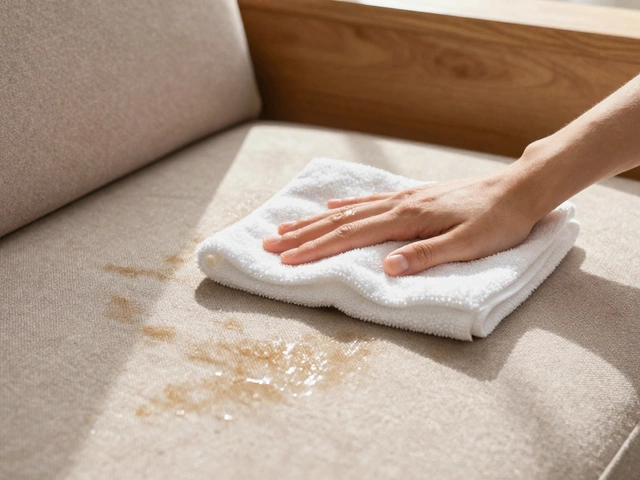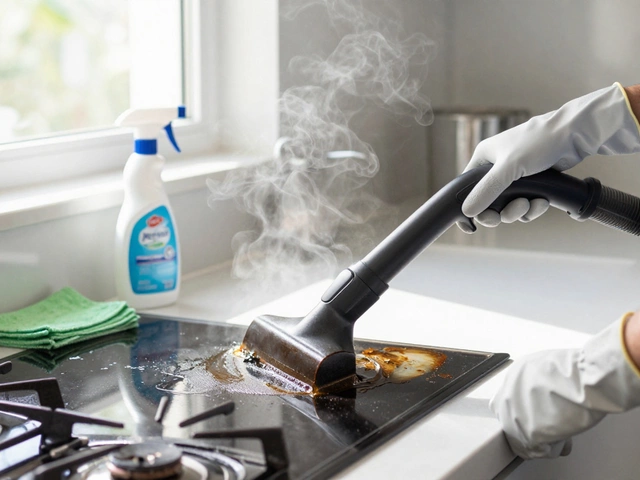You ever notice how a messy room can make you feel unsettled? There’s something about piles of laundry, crumbs in the corners, and stuffy air after winter that drags you down. The chaos outside finds a way to get inside your head. So when spring slides in, people don’t just open the windows – they attack those dust bunnies. But is there more to it than just clearing out the cobwebs? Is spring cleaning actually good for your mental health? Or is it just another old tradition we cling on to?
The Psychology Behind Tidying Up
Most people don’t realise how closely their environment links to their mind. In 2011, a group of researchers at Princeton found that physical clutter actually eats away at your ability to focus. It’s kind of shocking, but your brain has to work overtime to filter out irrelevant stuff, meaning the more mess around you, the harder it gets to concentrate. That scattered feeling when you walk into a room that’s a tip? That’s your brain, waving a little white flag. But it’s not just about immediate distraction. Clutter also sparks guilt (why haven’t I cleaned this yet?), frustration, and a nagging sense of failure. Over time, this background noise ramps up stress and drags you down emotionally.
Ever heard of the term “visual noise”? It’s real, and it messes with your well-being. Lots of people don’t realise that simply clearing a desk or emptying the bin can make the whole room feel lighter. In psychological terms, our minds love order. The simple act of crossing something off your cleaning list, finding a home for abandoned objects, or tossing out old receipts gives your brain a dopamine hit. Yes – the good stuff, the same buzz you get when you finally finish a task at work or nail a workout.
Clinicians in Sheffield and elsewhere have started to weave cleaning routines into therapy for depression and anxiety, focusing on the way small wins like making your bed or scrubbing your kitchen ritualistically mark the beginning of a brighter day. There’s even a term for this – “behavioural activation.” Cliché? Maybe. But there’s science to back up the satisfaction of a spotless kettle or crumb-free sofa.
The link between cleaning and mood is also cultural. Take the Japanese art of oosouji, a deep cleaning before New Year, which people believe clears out not just physical dirt but also bad luck. In the UK, the tradition is tied to brighter days – there’s an unmistakable surge of optimism when you fling open your windows and let the stale winter air out. That’s your surroundings telling your mind it’s time for something new.
Researchers have picked up trends pointing to anxiety disorders and hoarding appearing side-by-side. When clutter piles up, anxiety usually tags along. Flip that around – tidy spaces, more peace. It’s not magic, but it can feel close.
Spring Cleaning as a Mindful Routine
If you’ve ever gotten lost in scrubbing the tiles or sorting out the cupboard under the stairs, you know how meditative cleaning can feel. Mindfulness isn’t all about sitting cross-legged; it’s about being absorbed in the moment. And let’s be honest, it’s easier to focus on your breath when you’re attacking stubborn limescale than sitting in silence with your thoughts running wild. When people scrub, organise, or wipe, they usually find their mind slows down and the to-do lists quieten.
Not a fan of meditation? Try spring cleaning instead. Start by focusing on simple actions: the feel of a damp cloth in your hand, the sound of a vacuum, the smell of lemon cleaner. Each task gives you a tiny, immediate goal with a clear finish line. That’s the secret behind how a tidy-up helps with anxiety – it shifts your attention off worries and onto what’s right in front of you. Finishing one job after another adds up to a sense of real progress, especially when life feels stuck.
But does it work for everyone? The answer isn’t black and white. Some people find deep cleaning to be calming, others get overwhelmed at the idea of tackling everything at once. The trick is to set small goals. Try focusing on a single drawer, not the whole wardrobe. Break the cleaning into chunks. Make it a habit instead of a once-a-year chore and it goes from a stress bomb to a self-care win.
If cleaning feels like punishment, reframe it. Put your favourite playlist on. Reward yourself with a coffee after finishing a room. Invite a friend to help – shared effort, shared laughs. Every completed task is a step toward taking back control, and that feeling is huge for mental well-being.
- Pick one surface each day to declutter.
- Don’t force yourself to finish the entire house in one weekend.
- Make cleaning as social or solitary as fits your mood.
- Use scented sprays or fresh flowers to heighten the feeling of renewal.
The key is making the process manageable, enjoyable, and repeatable. Some studies show that routines bring comfort in uncertain times – so what’s more soothing than knowing exactly what comes next?

Physical Benefits That Echo into Emotional Health
People often overlook what a deep clean can do for their body, thinking the main pay-off is just that new-house smell. Truth is, a clean space does way more than just look good. Allergens hide in dust, pollen sticks to skirting boards, and mould spores party in damp corners. In Sheffield, pollen season lasts into June, so for lots of us, spring cleaning isn’t optional if we want to keep sneezing fits to a minimum.
Less obvious is how these physical tweaks help your mind. Get rid of dust mites, open the windows, and suddenly breathing feels easier. When you’re not distracted by blocked noses or itchy eyes, everything feels lighter. There’s also something to be said for the energy burn – an hour of vacuuming can torch 170-200 calories. Your body feels the work, and your brain gets the endorphins.
Proper spring cleaning also means addressing those jobs you ignore all winter – like clearing drip trays, shifting heavy furniture, or flipping mattresses. Each one requires focus, planning, and physical effort. This combo can drag even the most stubborn minds out of a mental rut. Exercise is a proven tool against depressive symptoms. So, if you can’t face a jog but still want the mood boost, scrubbing the stairwell or shaking out the rugs gets you moving in a way that feels useful, not forced.
But don’t just stop at tidying up – go a step further and get rid of things you never use. Studies out of London and Manchester have shown that reducing the sheer volume of “stuff” in your home slashes anxiety by making everyday routines easier. Fewer distractions, fewer lost keys, smoother mornings. You save time and brainpower, which pays off for your stress levels in a big way.
One tip I always push: check your cleaning products. Some contain strong chemicals that can irritate your lungs and skin, which adds to stress, not relief. Pick products marked “low VOC” or stick with vinegar, baking soda, and lemon to keep the air fresh. And don’t forget, getting kids involved in spring cleaning can be a life lesson in responsibility – plus it’s one less thing for your future self to worry about.
Turning Cleaning Into Lasting Positive Change
Here’s what hits home: the benefits of spring cleaning aren’t a one-off hit. Once you’ve done the initial blitz and felt that first rush of pride, it’s tempting to let things slide again. But routines set your mind at ease, long after the big push. Keep up with small daily habits – making your bed, wiping counters, binning post – and your space stays calm and inviting, not just in April but year-round.
If cleaning feels like a burden, pair it with things you enjoy. Listen to podcasts, phone a mate, or treat yourself after finishing a tricky job. Your reward doesn’t have to be big, just meaningful enough to anchor the habit. Over time, the practice of tidying builds self-trust. You see results of your own effort, rather than relying on outside fixes to feel better.
The emotional impact is clear whenever someone moves into a new flat or clears out after a breakup. People describe it like breathing easy again – a sharp reminder of how much our living spaces influence our headspace. If you’ve ever watched a friend light up after throwing out a car boot full of old junk, you know it’s real.
Lifestyle experts from the UK’s National Health Service now include home organisation in their advice for improving daily mood and motivation. It’s not the magic bullet, but it’s a straightforward trick that anyone can use. They found that keeping surfaces tidy and making “home-zones” (where everything has a place), makes it easier to switch off at night and get up with purpose in the morning.
If anxiety or sadness makes big tasks impossible, start tiny. Place one item in the bin. Wipe down just the sink, leave the rest for tomorrow. Small acts stack up into big changes, and by next spring, your space – and your mind – will thank you.
So, is spring cleaning good for mental health? In most cases, yes. It’s not a fix for everything, but it’s one of the simplest ways to clear out the cobwebs in your space and your thoughts. Next time life feels heavy, try tackling your room before your worries. It might just surprise you how much lighter the world seems from a cleaner, brighter home.





